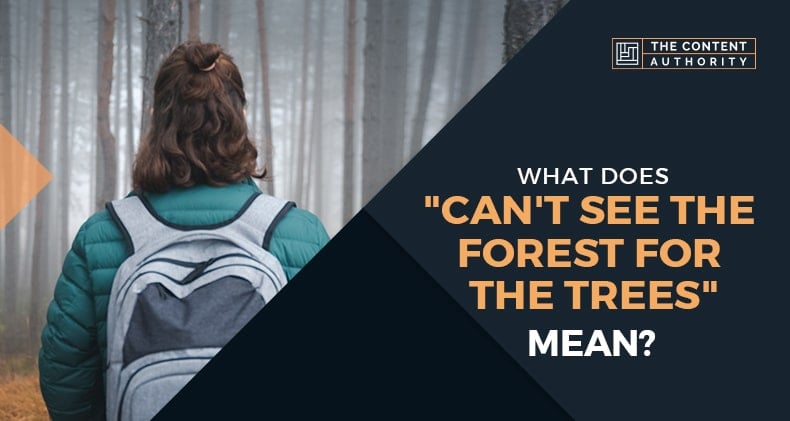The idiom “Can’t see the forest for the trees” is one of those usual English idioms which may be confusing for some people to understand. A reverse meaning of this expression can be when someone oversees the details in a situation because they are so involved in the totality of it.
“Can’t see the forest for the trees” is used when describing a person who cannot see a situation they are in as it truly is, instead they get lost in the details of it, and lose perspective on the bigger issue. In other words, one who gets blinded by a situation they are fully involved in.
Origin Of The Phrase

Even though this may just be an ancient fable, the story of the blind men and the elephant can enlighten us a bit more about the idea behind this idiom.
The parable of the blind men and an elephant began on the old Indian subcontinent. It has been broadly spread and become a very popular adage. A group of blind men who had never come in contact with an elephant before, developed the idea of what an elephant looks and feels like simply by touching it. Each one of the blind men put his hand on a different part of the elephant’s body, e.g. on the ear or tail. Once they got a good grasp on the body part they were feeling, they went on to explain what it was like based on their limited experience, thus being different one from the other. There are some versions of the parable in which one blind man doesn’t believe the other, resulting in a confrontation and other turmoil.
The lesson of the story is that humans only want to believe what it is they see based on their sole, personal experience and fail to recognize that someone else’s experience or idea may be just as true and valid as theirs.
The Buddhist and Hindu texts contain the initial versions of the blind men and the elephant adage. These consider the boundaries of perception and the importance of absolute context. There are a few Indian differences, but in general, another version goes like this:
A group of blind men were told of an animal they were unfamiliar with, an elephant, who was coming into town. None of them were aware of the elephant’s figure and form, therefore, out of interest, they said: “We must inspect and know it by touch, of which we are capable”. Then, they went ahead and began to touch the different parts of the elephant’s body to get an idea of what it may look like. The first blind man had fallen on the trunk and he said, “This being is like a thick snake”. Another blind man’s hand had landed on the elephant’s ear and he said it felt sort of like a fan. A third blind man’s hand landed on its leg and he expressed that the elephant was similar to a tree-trunk. The fourth blind man who had his hand on its side said, “elephant is a wall”. The fifth blind man touching the elephant’s tail, related it to a rope. The last blind man felt its tusk; he described it as being firm, smooth and like a blade.
Another interesting fable of this idiom goes back to the 1500s, as it was a well-known proverb published in collections. If you have been in a forest, you most likely were drawn to look at each single tree, rather than taking in the whole forest view. Sometimes, the word “woods” is used instead of “forest“; this may bring some confusion in thinking that it is referring to the actual wood of the trees and not the surrounding objects. In the case of saying, “can’t see the woods for the trees”, “woods” is referring to a small forest, not the tree trunk itself.
How People Use The Phrase

People may use this idiom to say something like “you can’t see the wood for the trees”; the most frequent way in the UK, when trying to describe how someone is unable to see the issue or situation clearly because they are so invested in it that they cannot see it from a greater angle. However, in the United States, the most common form is the original one in this article, “can’t see the forest for the trees”.
Example Of The Phrase In A Sentence
- The average person is so compartmentalized in their mind that they cannot see the forest for the trees.
- They are so worried about this small provision in the bill that they can’t see the forest for the trees. There are not even enough votes to pass the bill anyways!
- She is so caught up in his affection that she can’t see the forest for the trees.
- If overseas production is the main reason you guys are bashing Nike, you can’t see the forest for the trees.
- Bro, she only has the cats because she knows you hate it and is trying to drive you out. I guess you can’t see the forest for the trees.
- The way he’s obsessing over one doorknob when we’re renovating the entire house makes me believe that he cannot see the forest for the trees.
- I don’t think we can see the forest for the trees at this point; let’s get an outsider to take a look at the project and give us a progress report.
- Mark is so focused on product details that he can’t see the forest for the trees when it comes to the overall needs of the company.
- My sister can’t see the forest for the trees; that’s her only problem.
- Beginners don’t see the forest for the trees, and almost everyone makes the same mistakes.
Reversal And Other Meanings

Another usage of this proverb is “you can’t see the trees for the forest”, meaning that it is also a possibility that you are looking at something from too broad a perspective and skipping important details. It is considered just as unfavorable to be someone who makes big decisions without paying attention to the details, as someone who focuses too much on the details and forgets about the whole picture. You may have heard of an executive who is blamed for ‘not seeing the trees for the forest’ when they demand impossible submission deadlines for extensive projects.
This ‘exterior’ perspective, can contain the answer to solve a problem or take another look at things to make it better and perhaps lead it in the right way.
It is quite common that when someone is too involved in the minor details of things, it is easy for them to miss the important facts of the bigger issue which can eventually lead to a dark whole. The first step is to learn how to detect when this is happening to you in order to get out of your head and become better at solving a determined situation.
A life situation of “not seeing the forest for the trees” is when you are working on a problem at work for a long time and are having trouble getting around it. If you discuss it with someone outside of the project, they may be able to shed some light and give you a fresh perspective on it. They may even want to guide you on how to tackle the issue from a different angle.
Too Close To Clearly See
Someone walking through the forest may be more focused on the individual trees rather than the whole forest. Could you be in such proximity of an object that you become blind to see the greater objects around you or further from you? It is true that someone with an outside vision, such as, friends, family members, counselors, consultants, etc., can provide another outlook on any given issue you may have and help find a way to solve it when you are feeling stuck and unable to see further. However, this is not inviting you to involve everyone into your situations, but to seek assistance from a reliable source when available.
At some point in time, we have all suffered from not seeing the forest for the trees. You need a grand vision in order to have a right-minded point of view in certain situations. When you are too close to something; too in the midst of things, it will be hard to have a wholesome picture of the situation. An outside perspective is needed for enlightenment.
In the day to day life, there will always be little issues arising that need immediate attention. These small things may take all your time and energy making it hard for you to focus on bigger modifications that need to take place to solve the larger problems which are causing the smaller ones. You cannot effectively conquer the smaller problems since the biggest problems will always be bombarding you with new ones.
Conclusion
If you know you need to drive somewhere far and arrive before the nightfall, don’t spend the whole afternoon in your house figuring out what you will do once you get there. Otherwise, you will be doing exactly what this phrase stands for “focusing in the trees and missing out the entire forest”.
There you go, now you have a better understanding of this popular idiom and can always apply it in the right contexts.
Shawn Manaher is the founder and CEO of The Content Authority. He’s one part content manager, one part writing ninja organizer, and two parts leader of top content creators. You don’t even want to know what he calls pancakes.

